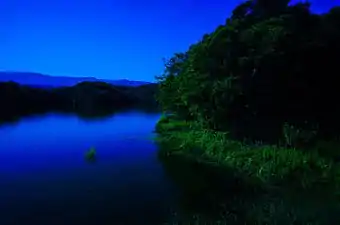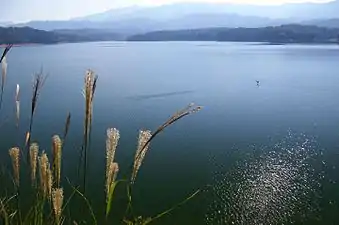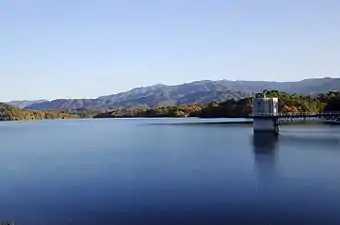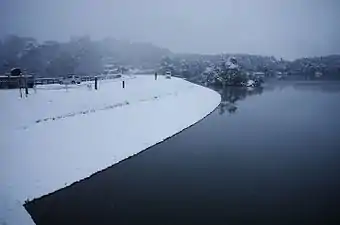Manno Lake
Manno Lake (Mannō Ike) in Mannō, Kagawa, Japan, is a man-made irrigation reservoir with a reserve capacity of 15.4 million tons. It is vaguely shaped like a human hand.
| Manno Lake | |
|---|---|
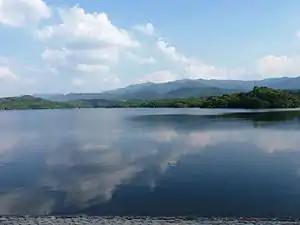 Manno Lake | |
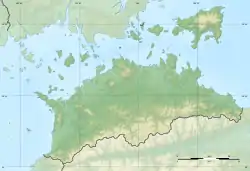 Manno Lake | |
| Location | Manno, Kagawa |
| Coordinates | 34.162°N 133.874°E |
| Native name | 満濃池 |
| Primary inflows | Doki River, Kanakura River |
| Basin countries | Japan |
| Surface area | 1.385 km2 (0.535 sq mi) |
| Max. depth | 30.14 m (98.9 ft) |
| Water volume | 0.0154 km3 (12,500 acre⋅ft) |
History
- 701-704 (Taiho era )
- Michimori Ason, the lord of Sanuki Province, erects the first dam.
- 818 (Kōnin era, year 9)
- Mannō Pond dam ruptures due to flooding.
- 821 (Kōnin era, year 12)
- Kukai is dispatched to oversee renovations of Mannō Pond dam, with construction being completed in approximately 3 months. Between the years of 821 and 1184, the Manno Pond dam collapses and is subsequently restored many times.
- 1184 (Genryaku era, year 1)
- After the collapse of the dam in 1184, all rebuilding efforts were abandoned until 1628 (Kan’ei, year 5). During this period, people settled in the basin constructing houses and cultivating fields. The settlement was named Ikeato Mura (After-Pond village).
- 1628 (Kan’ei era, year 5)
- By order of Takamatsu Domain feudal lord Ikoma Takatoshi the fushin-bugyō Nichijima Hachibe’e begins renovations of the Mannō Pond dam.
- 1631 (Kan’ei era, year 8)
- The Takamatsu domain completes renovations of the dam.
- 1854 (Ansei era, year 1)
- Dam collapses due to earthquake.
- 1870 (Meiji era, year 3)
- Restoration of dam completed. Afterward restorations, the three separate constructions of the Tenkawa headrace began, in order to supplement water intake from the Dokigawa, resulting in an increase of water volume three times.
- 1996 (Heisei era, year 8)
- Manno Pond selected as one of the One Hundred Soundscapes of Japanby the Ministry of the Environment.
- 2000 (Heisei era, year 12)
- Mannō Pond Conduit Gates (Japanese: 満濃池樋門, Hepburn: Mannō-Ike Himon) registered as Japanese cultural landmark- (buildings).
- 2005
- The Manno Pond dam receives the Dammed Lake Hyakusen certification from the Dam Watershed Environmental Improvement Center.
- 2010
- Manno Pond receives the Pond Hyakusen certification from the Japanese Ministry of Agriculture, Forestry, and Fisheries.
Data
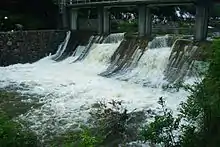

- Current data
- Dam type: Earth-filled storage dam
- Dam height: 32.0m
- Dam length: 155.8m
- Shore Length: 19.7km
- Water volume: 15,400,000 cubic meters
- Waterbody surface area: 342.2 acres
- Basin Surface area: 348.9 acres
- Catchment area: 8004 acres
- Tributaries: Kanakura River, Doki River (via the Tenkawa Headrace)
- Data from 821 (Konin era, year 12)
- Dam height: 22m
- Shore length: 10.58km
- Waterbody surface area: 200acres
- Water volume: 5,000,000 cubic meters
- Tributaries: Kanakura river
- Data from 1631 (Kan’ei era, year 8)
- Dam height: 22.72m
- Dam length: 81.81m
- Shore length: 8.2km
- Regions supplied with water: 128.704 square kilometers between Naka-Gun, Uta-Gun, and Tado-Gun
- Tributaries: Kanakura river
- Data from various embankment constructions
- First embankment construction water volume: 6,678,000 cubic meters
- Second embankment construction water volume: 7,800,000 cubic meters
- Third embankment construction water volume: 15,400,000 cubic meters
Yuru-Nuki

A "Yuru" is a water reservoir plug. Yuru-Nuki ceremony, which is held on annually on June 15 at Manno Pond, releases water to irrigate fields for the rice-planting season.
Access
- Car
- From Okayama, Ehime, and Kochi: About 30 minutes from Zentsuji IC of Takamatsu Expressway
- From Tokushima: About 55 minutes from Mima IC of Tokushima Expressway
- Railway
- JR: About 15 minutes by taxi from Kotohira station
- Kotoden: About 20 minutes by taxi from Kotoden Kotohira Station / About 15 minutes by taxi from Okada Station
- Airplane
- Takamatsu Airport: About 55 minutes by taxi
References
External links
 Media related to Mannoike at Wikimedia Commons
Media related to Mannoike at Wikimedia Commons- Official website (in Japanese)
This article is issued from Wikipedia. The text is licensed under Creative Commons - Attribution - Sharealike. Additional terms may apply for the media files.





